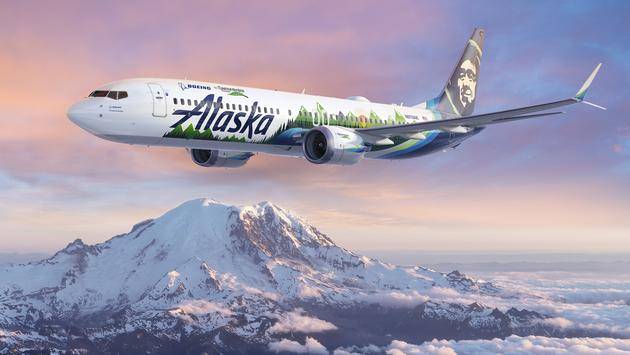Alaska Airlines and Boeing today announced that they’re partnering to realize Boeing’s latest ecoDemonstrator program, which will test around 20 promising eco-friendly and sustainable technologies aboard a new Alaska Airlines 737-9 aircraft.

Together with nine other partner companies, Boeing and Alaska will evaluate the new technologies during five months of ecoDemonstrator test flights, set to begin this summer. Among the tech projects whose performance will be assessed during that period are an engine nacelle designed for noise-reduction, cabin sidewalls constructed from recycled materials and a new halon-free fire-extinguishing agent that considerably reduces impacts upon the ozone layer. After the evaluation period, the airplane itself will be reconfigured for passenger service and delivered to Alaska Airlines.
"We have a long history of working with Boeing to advance aviation technology, safety and fuel efficiency," said Diana Birkett Rakow, Alaska Airlines' vice president, public affairs and sustainability. "Alaska Airlines flies to some of the most beautiful and geographically diverse regions in the world and we are committed to finding ways to reduce climate impacts across our network. This work with Boeing to accelerate innovation on the ecoDemonstrator program enables us to contribute to a more sustainable future for our global community."
"Boeing is committed to continually improve air safety and the environmental performance of our products," said Stan Deal, Boeing Commercial Airplanes president and CEO. "We're proud to collaborate with our hometown customer and other partners around the world this year to make flying more sustainable."
Boeing’s ecoDemonstrator test flights are flown using a fuel-blend of traditional petroleum-based products and sustainable aviation fuel (SAF). Already in regular use within the industry, SAF reduces life-cycle CO2 emissions by up to 80 percent, making it the most immediate solution for the widespread reduction of carbon emissions produced by commercial aviation operations over the next two to three decades. In January 2021, Boeing committed itself to ensuring that it’s producing commercial aircraft that are capable and certified to run on 100-percent SAF by the year 2030 .
Technology projects being tested as part of the ecoDemonstrator program include:
—A new fire-extinguishing agent, intended to replace Halon 1301 (no longer being produced), which significantly reduces negative effects on the Earth’s ozone layer.
—Measuring atmospheric greenhouse-gas levels to support the U.S. National Oceanic and Atmospheric Administration’s climate modeling and long-term forecasting efforts.
—Application of acoustic-lining concepts within the engine nacelle that could reduce noise for current engines and inform next-generation engine designs.
—Cabin sidewall panels produced using recycled carbon composite material from Boeing 777X wing production. Durable and lightweight, this material could contribute to reducing fuel use and carbon emissions, and support Boeing’s sustainable manufacturing goals.
Since 2012, Boeing has brought nearly 200 promising technologies out of the lab for in-flight testing via the ecoDemonstrator program, and a number of them have been adopted for use in Boeing’s current- and future-model airplanes, including:
—Advanced Technology winglets on the 737 MAX family, which help to reduce fuel use and emissions.
—iPad apps that provide real-time weather and other data to pilots, improving fuel efficiency and reducing CO2 emissions. These apps also complement Boeing's digital analytics services, which are offered to help airlines optimize fleet utilization.
—A camera system on the new 777X that will enhance safety by helping pilots avoid obstacles on the ground.
"Boeing put additional emphasis on sustainability in 2020 to align with our stakeholder and business priorities as well as our values," Boeing Chief Sustainability Officer Chris Raymond said. "Through our collaboration with industry partners, the ecoDemonstrator program is a great example of our commitment to work together to make flying safer and more sustainable for current and future generations."
For more information, visit boeing.com/ecodemonstrator .

Leave a Reply